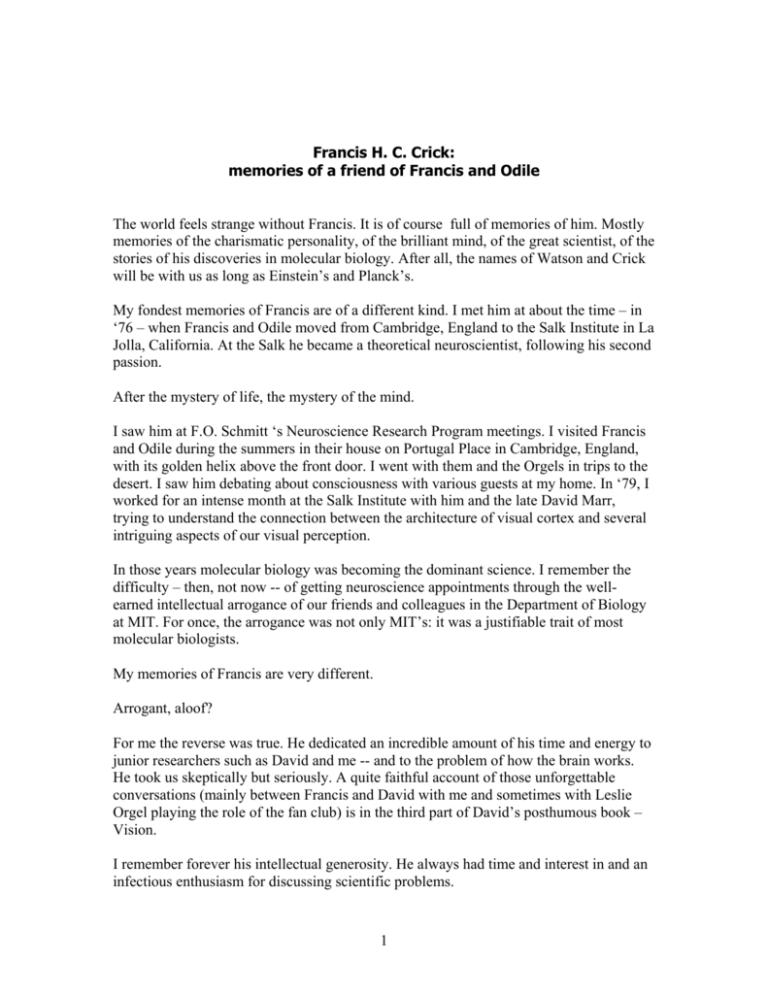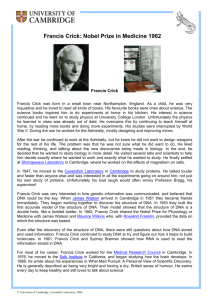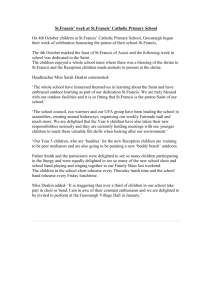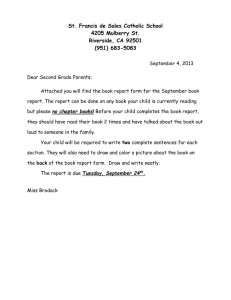Dad had a lot of fiends and we've had quite a few letters in the last
advertisement

Francis H. C. Crick: memories of a friend of Francis and Odile The world feels strange without Francis. It is of course full of memories of him. Mostly memories of the charismatic personality, of the brilliant mind, of the great scientist, of the stories of his discoveries in molecular biology. After all, the names of Watson and Crick will be with us as long as Einstein’s and Planck’s. My fondest memories of Francis are of a different kind. I met him at about the time – in ‘76 – when Francis and Odile moved from Cambridge, England to the Salk Institute in La Jolla, California. At the Salk he became a theoretical neuroscientist, following his second passion. After the mystery of life, the mystery of the mind. I saw him at F.O. Schmitt ‘s Neuroscience Research Program meetings. I visited Francis and Odile during the summers in their house on Portugal Place in Cambridge, England, with its golden helix above the front door. I went with them and the Orgels in trips to the desert. I saw him debating about consciousness with various guests at my home. In ‘79, I worked for an intense month at the Salk Institute with him and the late David Marr, trying to understand the connection between the architecture of visual cortex and several intriguing aspects of our visual perception. In those years molecular biology was becoming the dominant science. I remember the difficulty – then, not now -- of getting neuroscience appointments through the wellearned intellectual arrogance of our friends and colleagues in the Department of Biology at MIT. For once, the arrogance was not only MIT’s: it was a justifiable trait of most molecular biologists. My memories of Francis are very different. Arrogant, aloof? For me the reverse was true. He dedicated an incredible amount of his time and energy to junior researchers such as David and me -- and to the problem of how the brain works. He took us skeptically but seriously. A quite faithful account of those unforgettable conversations (mainly between Francis and David with me and sometimes with Leslie Orgel playing the role of the fan club) is in the third part of David’s posthumous book – Vision. I remember forever his intellectual generosity. He always had time and interest in and an infectious enthusiasm for discussing scientific problems. 1 He did not suffer fools who made claims based on flimsy evidence. Any scientific theory must be based on hard facts. He was, however, extremely patient with curious people. I remember him after a talk at MIT – he must have been quite tired – patiently and gently answering what seemed an endless series of questions from students and random people who stayed on after the huge audience had left. I remember forever his joy for life and for science – a wonderful gift of Francis and Odile to their friends. I am not sure they know, but visiting them, in the last few years in their house in La Jolla, was for me – two decades their junior – a unique way to refresh my mind, recharge my batteries, regain a sense of adventure and fun in research and in life. He was a gentleman of science. I remember the many working conversations at breakfast in their kitchen overlooking the pool and more conversations next to it. It was a civilized, though deceptively relaxed, style of research. At a time when old-fashioned virtues of courtesy and manners are in short supply, it was delightful to meet a gentleman with impeccable manners and bearing. Over the last few months, I visited and spoke often with him on the phone. Sometimes he was almost apologetic about working too little, not having the energy to focus more. But how much he had done. And how proud Odile and the Crick family must be. In science, in life, and in death he was an inspiration. His courage was exemplary, that most lonely virtue. He accepted his disease in an impressively rational way. He did not seem to worry about it and certainly he did not bother his friends. Meanwhile his enthusiasm for science and for conversation with friends continued unabated. A few weeks before he died, he talked to me enthusiastically and at length over the phone about a new paper he was just writing. During the last five years, I came to admire Francis even more. I admire him as a human being at least as much as a scientist. I admire his courage – and Odile’s. All of us will sorely miss him. But Francis’ mind will live on for us through his papers, books, letters and – especially – in our own memories. Tomaso Poggio Eugene McDermott Professor, M.I.T. 2 Subject: Francis Crick Memorial: Salk Institute From: Richard Murphy <murphy@salk.edu> To: Jim Watson, Sydney Brenner, Alex Rich, Seymour Benzer, Aaron Klug, Christof Koch, Pat Churchland, Vilayanur Ramachandran, Tomaso Poggio, Leslie Orgel, Terry Sejnowski, and Michael Crick. As you know, Francis Crick has passed away. To honor him, the Salk Institute will be holding a memorial service on September 27, 2004, 1:30-3:00 p.m. at the Institute here in La Jolla. I write to invite you to speak at that memorial ceremony. I, along with Odile Crick, Leslie Orgel, and Sydney Brenner, who helped put together the speaker list, hope you can participate. Briefly, the memorial will be held out of doors on the Salk Institute courtyard. Therefore, slide or Power Point presentations will not be possible. We expect 1000 or more attendees. The audience will consist of faculty, students, visiting scientists, and lay people from the community, including trustees and supporters. We are also investigating whether the ceremony can be streamed via the Web to other parts of the world. Twelve speakers will be presenting, so each presentation should last no more than five minutes. Prior to the ceremony (12:00 noon) we will be hosting a VIP luncheon that will be attended by the Crick family, and all Salk faculty; following the ceremony, we will host a reception. Please do plan on attending both events. We are also preparing a memorial book for the ceremony (libris amicorum) for which we are requesting that each speaker provide us a one page letter of remembrance of Francis. Because of our tight production schedule, we need the letters sent back to me (e-mail is fine) by no later than Wednesday, August 25 (approximately two weeks from today). Unfortunately, this is a hard deadline, and letters received after that time will not be able to be included. This memorial service will be costly for the Institute and therefore we would be grateful if you could cover your own travel and housing expenses. If that is not possible, however, please let us know and we will do our best to help cover your expenses. Please let me know whether you can participate. We look forward to receiving your letter of remembrance by August 25, and to welcoming you to La Jolla to honor a truly remarkable scientist and friend. With best wishes and warm regards. Sincerely yours, Richard Murphy Richard Murphy, PhD President and CEO Salk Institute for Biological Studies La Jolla, California Tel: 858 453 2430 Fax: 858 546 0838 3 4



